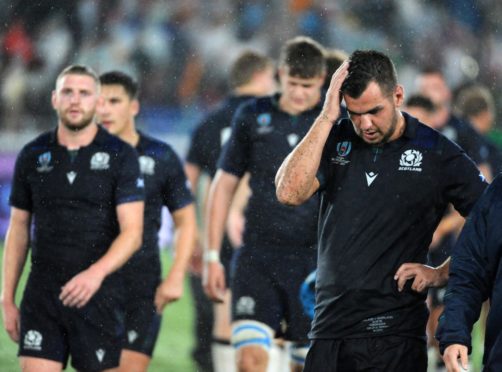One of the more curious elements of recent rugby relations between Scotland and Ireland is the apparent perception among some of the Irish that the Scots ‘talk themselves up’.
I’m not entirely sure where this all began. Prior to the 2017 match at Murrayfield, former Ireland 10 Ronan O’Gara, on analyst duty, talked about “putting the Scots back in their box”.
That worked out well for him – it was the last time the Scots beat Ireland. In fact the only time in the last 11 meetings of the sides.
Eddie O’Sullivan – the man who was Ireland’s head coach before they were really good – chimed in a couple of years later, again in a TV analyst role.
Eddie got quite upset about Scotland ‘talking themselves up constantly’ and failing to deliver. Pretty much like it was a personal insult to him and to Ireland in general.
An ‘expert’ joins in
Scotland head coaches in the pro era: Townsend W25 L 19 D1; Cotter W19 L17; Telfer W9 L11; Robinson W15 L19 D1; McGeechan W18 L24 D1; Hadden W16 L25; Dixon/D Johnson W5 L10 D1; S Johnson W 5 L11; Williams W3 L14. Yes, he was so crap, Scott Johnson was nearly twice as good.
— Steve Scott (@C_SScott) April 2, 2021
The baton has been grasped wholeheartedly more recently by an old ‘friend’, Matt Williams.
Williams, of course, was with for Scotland for two years during which time he compiled not only the worst record of any head coach in the post, but also the worst record of any head coach of any Tier One nation other than Italy.
He was deservedly fired by Scotland for winning just three games in two years – against Italy, Samoa and a team of actual amateurs touring as Japan. Then he spent three years in charge of Ulster, before leaving in 2010. He hasn’t had a real coaching job since.
Since then he’s somehow got himself a gig as a studio ‘expert’ on Irish TV, where he gleefully ploughs the narrative of Scotland being arrogant and ‘talking themsleves up’, often quoting his ‘sources within Murrayfield’.
Seriously, I know of exactly one person who is still employed at EH12 16 years on from Matt’s tenure.
The record speaks for itself
Of course, it’s all complete nonsense. We’ve noticed Scotland’s record against Ireland in the past decade. It’s properly dire.
I’m pretty sure there’s not been any directly arrogant or over-confident talk coming from the Scottish camp prior to games with Ireland during the last ten years.
Respect, admiration, and an acknowledgement of Ireland’s status as one often most successful teams of the era. The No 1 team in the world most recently.
Sometimes there’s a certain (misplaced) confidence, but that’s surely okay? No team should approach a challenge of this sort with negative vibes. And it’s not as if the Irish are so needy to expect the Scots to bow and genuflect before them, surely.
I don’t believe it’s in the Scottish psyche to be that arrogant about anything anyway, but even less so when the evidence is so clearly skewed against us.
So it’s puzzling. Perhaps this is some in Ireland’s way of reverting to the comfortable role of underdog, giving themselves some ‘bulletin board’ material. Of course, Ireland are no-one’s underdog right now.
As we long discovered with Eddie Jones, pre-match barbs and assertions about the opposition are almost always directed entirely at your own dressing room.
And we should regard those in the Irish media who plough this false narrative in exactly the same way we did Eddie – roundly ignore them. Why should we care what the Irish rugby media thinks of Scotland anyway?
But if that narrative came from Scots, then that’s entirely different.
Two pivotal matches in 2023
Scotland drawn with South Africa and Ireland for the 2023 Rugby World Cup in France.
Read more 👇
— Scottish Rugby (@Scotlandteam) December 14, 2020
Scotland face Ireland twice this season, on Sunday and again in the World Cup in Paris later in the year. As we’ve noted – continually – in this column, these are the pivotal matches of 2023. Probably of Gregor Townsend’s entire six-year tenure as head coach.
Townsend’s time has picked off a lot of the old disagreeables in Scotland’s modern record. Wins have come Sydney, in Wales, in Paris, twice at Twickenham. They haven’t beaten South Africa or New Zealand, but got closer than ever before.
The biggest blot on his reign is his awful record against Ireland. Townsend is as aware of this as anyone.
There’s been obvious (and largely successful) tweaks in the gameplan we’ve seen since November. But I’d be surprised if there’s not been specific focus for some time on the extra elements it’ll take to finally beat Ireland.
Now, whether they can be successful or not is an entirely different matter. I don’t really want to revert to the Telferesque cliche that this is Scotland’s “Everest”, but it’s about right.
Bending Scotland to their will
Ireland’s supremely drilled gameplan has bent successive games against the Scots to their will. Last year’s Dublin game was a case in point. 15 penalties conceded, most of which played right into the Irish wheelhouse of creating an attacking setpiece in the Scottish 22.
Scotland actually defended Ireland’s ‘redzone’ drills reasonably well that day. But the cumulative number they gifted still made a heavy defeat inevitable.
Ireland have been a far looser than normal in their three games in the championship thus far. They’ve still won them all reasonably comfortably. But knowing their Plan A works so well – and has repeatedly – against Scotland, why would they change?
That’s the level of challenge for Scotland. To make 2023 really relevant, Scotland have to finally get over this Green Hump. It has to start on Sunday.
There’s been no arrogance or ‘talking themselves up’, really. But it IS long past time that Scotland actually walked the walk against the Irish.
